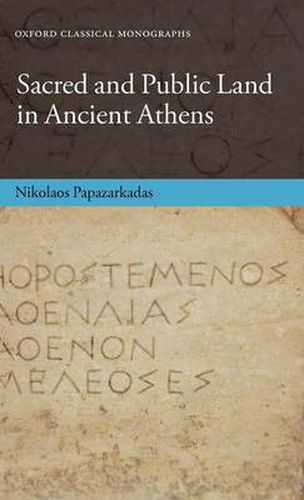Readings Newsletter
Become a Readings Member to make your shopping experience even easier.
Sign in or sign up for free!
You’re not far away from qualifying for FREE standard shipping within Australia
You’ve qualified for FREE standard shipping within Australia
The cart is loading…






Landed wealth was crucial for the economies of all Greek city-states and, despite its peculiarities, Athens was no exception in that respect. This monograph is the first exhaustive treatment of sacred and public - in other words the non-private - real property in Athens. Following a survey of modern scholarship on the topic, Papazarkadas scrutinizes literary, epigraphic, and archaeological evidence in order to examine lands and other types of realty administered by the polis of Athens and its constitutional and semi-official subdivisions (such as tribes, demes, and religious associations). Contrary to earlier anachronistic models which saw sacred realty as a thinly disguised form of state property, the author perceives the sanctity of temene (sacred landholdings) as meaningful, both conceptually and economically. In particular, he detects a seamless link between sacred rentals and cultic activity. This link is markedly visible in two distinctive cases: the border area known as Sacred Orgas, a constant source of contention between Athens and Megara; and the moriai, Athena’s sacred olive-trees, whose crop was the coveted prize of the Panathenaic games. Both topics are treated in separate appendices as are several other problems, not least the socio-economic profile of those involved in the leasing of sacred property, emerging from a detailed prosopographical analysis. However, certain non-private landholdings were secular and alienable, and their exploitation was often based on financial schemes different from those applied in the case of temene. This gives the author the opportunity to analyze and elucidate ancient notions of public and sacred ownership.
$9.00 standard shipping within Australia
FREE standard shipping within Australia for orders over $100.00
Express & International shipping calculated at checkout
Landed wealth was crucial for the economies of all Greek city-states and, despite its peculiarities, Athens was no exception in that respect. This monograph is the first exhaustive treatment of sacred and public - in other words the non-private - real property in Athens. Following a survey of modern scholarship on the topic, Papazarkadas scrutinizes literary, epigraphic, and archaeological evidence in order to examine lands and other types of realty administered by the polis of Athens and its constitutional and semi-official subdivisions (such as tribes, demes, and religious associations). Contrary to earlier anachronistic models which saw sacred realty as a thinly disguised form of state property, the author perceives the sanctity of temene (sacred landholdings) as meaningful, both conceptually and economically. In particular, he detects a seamless link between sacred rentals and cultic activity. This link is markedly visible in two distinctive cases: the border area known as Sacred Orgas, a constant source of contention between Athens and Megara; and the moriai, Athena’s sacred olive-trees, whose crop was the coveted prize of the Panathenaic games. Both topics are treated in separate appendices as are several other problems, not least the socio-economic profile of those involved in the leasing of sacred property, emerging from a detailed prosopographical analysis. However, certain non-private landholdings were secular and alienable, and their exploitation was often based on financial schemes different from those applied in the case of temene. This gives the author the opportunity to analyze and elucidate ancient notions of public and sacred ownership.